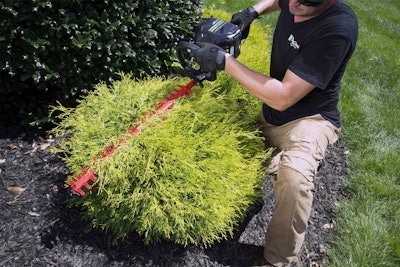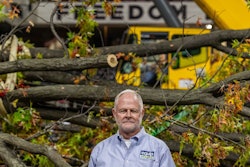 Photo: Greenworks
Photo: GreenworksIf you talked to landscapers ten years ago, the idea of battery-powered equipment being comparable to gas-powered tools would have been laughable.
Yet in recent years advancements in technology have led to more powerful lithium-ion batteries and increasingly powerful products as well. As more manufacturers begin to introduce commercial-level products, the idea of using a battery-powered tool over a gas one is less of an alien concept.
“Battery-powered outdoor equipment is on the rise and consumers are choosing that and walking away from gas power,” said Gary Abercrombie, director of global marketing for Greenworks. “We’re starting to see that with the commercial landscape industry. It’s because of the different usage and needs that they have. They expect equipment that’s going to work even more robustly than their consumer targeted counterparts.”
While most will agree that it depends on the piece of equipment, there are indeed certain products that hold their own against gas power. Christian Johnsson, product manager for Husqvarna’s handheld and battery products, says that their hedge trimmer, the 536LiHD60X, has taken the world by storm.
“I think the reason for that is first of all you have a gear box on the hedge trimmer and that makes the battery last longer because you don’t have to run it on a high RPM, so the battery will last for a long time,” Johnsson said.
In a head to head of running the 536LiHD60X under a full load against Husqvarna’s gas-powered hedge trimmer, the 226HD60X, the battery-powered model lasted for over an hour on one fully powered battery, while the gas-powered one lasted just past 50 minutes.
Meanwhile, the more demanding products are still struggling on the battery side and the most obvious example is the blower.
“The products that need more power and more battery capacity are the ones that are suffering, and to this date we’re seeing that out of blowers,” Johnsson said. “Blowers are very power consuming because they are constantly under load. I mean, the fan is constantly under load pressing air through the fan so that’s one example, and the other example is chainsaws.”
While the battery-power is not quite there yet for the blowers, Johnsson says it is more a question of when rather than if battery power will reach that level.
Jason Page, operations manager with Merit Service Solutions, based in Austin, Texas, believes that as the technology gets better and better, battery power should eventually overtake gas equipment.
 Stihl says its professional backpack battery delivers gas-powered performance.
Stihl says its professional backpack battery delivers gas-powered performance.Photo: Stihl
“A different way of looking at it would be to compare a cassette tape (gas powered) vs compact disk (electric equipment), and we all know how that turned out,” Page said. “It didn’t happen overnight but eventually they just went away due to the compact disk getting better and better, where the cassette tape just stayed the same.”
While Merit Service Solutions doesn’t solely use electric equipment, Page says this is only because of the lack of availability from manufacturers.
“Currently we are still using gas stick edgers, propane walk-behinds and propane zero-turn mowers,” he said. “We have tried most of the manufactures’ handheld equipment over the last three years and yes, we have a graveyard of some that have failed and some that are still running like new after three years of abuse.”
Despite the benefits of being quieter, more environmentally friendly and reduced maintenance costs, there are two main challenges that battery power faces when trying to win over landscapers.
The first issue is simply a reluctance to change. According to Page, teaching the crews about the electric equipment took some adjusting, but once they had time to re-think how to use the products in a different manner to perform the same job they realized it really does work.
A common complaint is having to change out the batteries during the day once a full charge is used, but Johnsson says this can be overcome with the right thinking.
“I think one of the things is that most landscapers are so used to stopping by the gas station on their way out in the morning and refueling their equipment and gas cans and their trucks and whatever else it might be, so it’s a habit for them,” he said. “They know how to do it. It’s just something you have to overcome and understand the basics of the batteries. For example, if you had one of our line or string trimmers, and you use it for eight hours straight. You can do that as long as you have two batteries: one battery in the charger constantly and one battery in the product. And you can just change them whenever they run out of charge.”
Page says while at first it took some trial and error to see how long each battery run time was, the problem was easily solved by having batteries charged while using the electric equipment, so once one goes dead there is another one waiting to go.
Sebert Landscape based in Bartlett, Illinois, overcame the challenge of charging in the field by outfitting its trailers with solar panels that power the battery charging stations inside the trailers.
 Greenworks’ 82-volt hedge trimmer has a run time of 1.5 hours with a fully charged 2.5Ah battery.
Greenworks’ 82-volt hedge trimmer has a run time of 1.5 hours with a fully charged 2.5Ah battery.Photo: Greenworks
“I’ve never had an issue with running out of batteries, never been frustrated with or out of power,” said Greg Taylor, owner of GTM Services in Largo, Florida, who uses DeWalt’s battery-powered products. “It feels like a tank of gas. When I switched over (to a new battery), there was no more of a stop than you would normally take for gas, and switching the battery out is much quicker.”
The other main point of contention is the cost. The initial sticker shock is enough to keep some at bay, especially if they are already skeptical about the product’s capability to keep up with gas.
“You need to think about the cost in a different way when you buy the product,” Johnsson said. “You also need to think about the fact that you’re buying fuel upfront basically because you can use those batteries for a couple of years, depending on how much you run it. Compare it to buying a gas trimmer alongside with gas for three years, maybe, and what would the price of that be?”
Over time these costs can be recuperated by no longer having to pay for fuel, oil or air filters, and the ability to work quietly for longer. The commitment to using battery power can also attract new business.
“I just recently sent out two landscape maintenance contracts, and in the RFP (request for proposal) I stated that we would only use electric equipment on these properties. The very next morning my phone was ringing with the managers wanting to know more,” Page said.
For most, it seems that trying and seeing for themselves is the main way that landscapers are discovering battery power is truly viable.
“I can honestly say I was skeptical at first until I started using it and started to understand how it is different, but the end results are the same,” Page said. “If landscapers are not open to change, then eventually they will get left behind. If landscapers want to separate from the herd and be known for something different than everyone else, then they should be open minded and give the electric equipment a try.”









